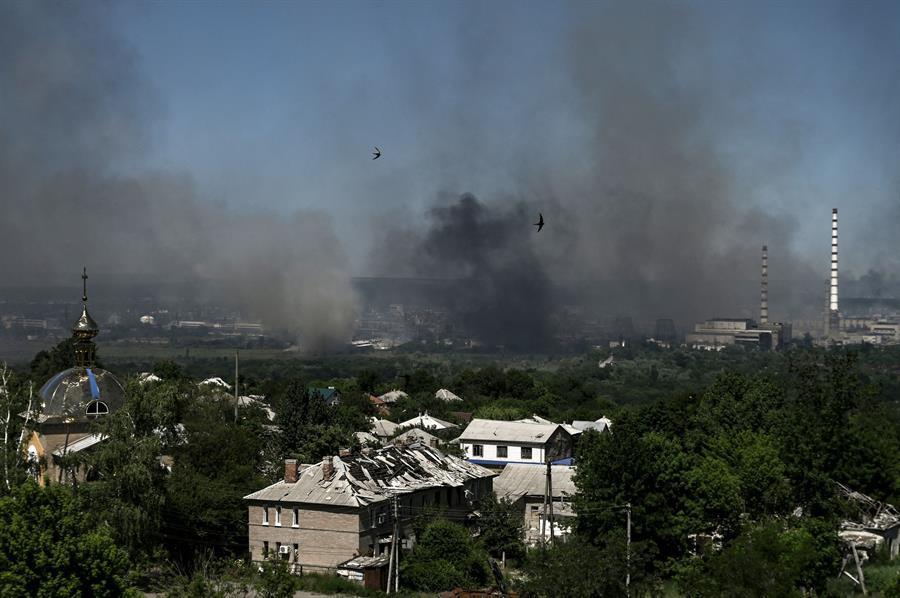
US President Joe Biden said Friday that his Ukrainian counterpart Volodymyr Zelensky "didn’t want to hear" American warnings ahead of Russia’s invasion of his country.
"I know a lot of people thought I was exaggerating," Biden said at a fundraising reception in Los Angeles, referring to his forewarning of the possibility of a Russian attack.
"But I knew we had data to sustain (the assessment)," he added in front of reporters.
"(Russian President Vladimir Putin) was gonna go into the border. And there was no doubt, and Zelensky didn’t want to hear it, nor did a lot of people. I understand why they didn’t want to hear it, but he went in."
The United States began raising the alarm over Russia’s preparations for an invasion of Ukraine well before Putin announced the "special operation" against the country on February 24.
The warnings were met with disbelief and even veiled criticism from some European allies, who at the time felt the United States was being too alarmist.
EU chief Ursula von der Leyen visited Ukraine on Saturday to discuss the country’s hopes of joining the bloc, as President Volodymyr Zelensky warned the world not to look away from the conflict devastating his country.
Von der Leyen’s visit -- her second since Russia’s February 24 invasion -- came as fierce battles continued in the east and south of Ukraine.
"With President Zelensky I will take stock of the joint work needed for reconstruction and of the progress made by Ukraine on its European path," she tweeted on arrival in Kyiv.
Ukraine has been pushing for rapid admission into the European Union, but officials and leaders in the bloc have cautioned that membership could take years or even decades.
Von der Leyen told reporters the discussions "will feed into our assessment" of Ukraine’s readiness to be considered a candidate country to begin lengthy negotiations, including on reforms.
Ahead of a June 23-24 EU leaders’ summit that will likely take up the matter, Zelensky questioned why some member states were still hesitant.
"The European system could lose if words are not accompanied by deeds," he told the 2022 Copenhagen Democracy Summit on Friday.
He later urged the world not to lose sight of what was happening in Ukraine, after more than three months of war that has left thousands dead and sent millions of Ukrainians fleeing.
He said Ukraine must "not allow the world to divert its attention away from what is happening on the battlefield".
Zelensky reported continued "very difficult battles" including in the eastern Donbas region where Moscow has concentrated its firepower, especially around the eastern industrial city of Severodonetsk.
South-west of Severodonetsk, in the village of Soledar, a Ukrainian soldier who gave his name as Sergey was bullish.
"The enemy is very defiant, trying to go through our defence with small groups," he told AFP from a field where a Ukrainian tank was hiding near some trees.
"But they of course fail, because our infantry units at the front are doing a good job at locating their advances from observation positions. We, of course, repel them."
He added: "The truth is on our side, it’s our land that we are defending."
However, in the Mykolaiv region near the front line in the south, regional governor Vitaliy Kim stressed the urgent need for international military assistance.
The US and other Western allies have provided huge amounts of weapons and cash to Ukraine to help it fend off its neighbour, while also punishing Moscow with economic sanctions.
But Kim said: "Russia’s army is more powerful, they have a lot of artillery and ammo. For now, this is a war of artillery... and we are out of ammo.
"The help of Europe and America is very, very important."
Further north in Kharkiv, regional governor Oleg Synegubov said Ukrainian forces were making advances but accused Russian forces of targeting attacks on civilian targets.
Shockwaves from the conflict have reverberated around the world, with fears mounting of a global food crisis. Before the war, Ukraine was an agricultural powerhouse and a major grain exporter.
An adviser to French President Emmanuel Macron said France was ready to assist in an operation to allow safe access to Ukraine’s Black Sea port of Odessa.
It has been subject to a de facto blockade by Russia, with grain waiting to be shipped.
France wants "victory for Ukraine", the advisor added, after Macron sparked controversy recently by suggesting Russia should not be humiliated.
Moscow invaded Ukraine in February after weeks of warnings from the United States and its allies that Russia was planning an invasion.
Western countries reacted this week with fresh outrage after pro-Kremlin separatist authorities in the Donetsk region of the Donbas sentenced to death Britons Aiden Aslin and Shaun Pinner, and Saadun Brahim of Morocco.
Germany’s foreign ministry said the "shocking" sentences show "once more Russia’s complete disregard for international humanitarian law".
The United Nations warned that unfair trials of prisoners of war amounted to war crimes.
Ukrainian courts have handed three Russian soldiers long prison sentences at war crimes trials since the invasion.
Russia has repeatedly cautioned the West against getting involved in the conflict, with some officials warning of the risk of nuclear war.
The world’s chemical weapons watchdog said Friday it was keeping a close eye on Ukraine to monitor "threats of use of toxic chemicals as weapons".
President Vladimir Putin has said that what Russia calls its special military operation is meant to "de-Nazify" Ukraine, suggesting he is merely taking territory back.
But US Defense Secretary Lloyd Austin issued scathing criticism of the invasion and its aims on Saturday.
"Russia’s invasion... (is) what happens when big powers decide that their imperial appetites matter more than the rights of their peaceful neighbours," he said at the Shangri-La Dialogue security summit in Singapore.
"And it’s a preview of a possible world of chaos and turmoil that none of us would want to live in."